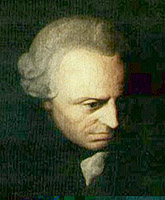for Nineteenth Century Philosophy

Any serious course in nineteenth-century European philosophy must presuppose some knowledge of Kant. I am delighted to be able to teach these philosophers to students who have already read the entire Critique of Pure Reason. Very few undergraduate courses in 19th century philosophy can start where we can start.
Philosophers after Kant were as much influenced by the second and third Critiques as by the first. If you haven't already had some exposure to these, you might wish to browse the library or web to see something of their important points, although this is not at all required.
As preparation for our course, and as background to the reading, please refresh yourself on the following issues. Try to frame at least a preliminary answer to each question. Where you have difficulty, pull out your well-marked copy of the Critique of Pure Reason and look for clues. (For review help, see the links I've collected for our Kant course.) I've limited these questions to those topics from the first Critique that are most often picked up and developed by the philosophers and works we'll study in our course.
- Why did Kant posit the thing in itself? What were his arguments for its existence and for its unknowability? Exactly what is knowable and unknowable about the thing in itself?
- What kinds of idealism does Kant support and affirm, and what kinds does he refute and reject?
- What is "given" for Kant, as opposed to what is constituted by the mind? From whence is it given?
- What is Kant's concept of the human self? What is the "object" of self-consciousness? of self-identity? What is the difference between the being and the knowledge of the self?
- Is there a "self in itself" analogous to the thing in itself? What kinds of self are knowable and what kinds are not? What kinds of self are knowers and what kinds are not?
- In what sense are time and space empirically real? transcendentally ideal? In what sense(s) is Kant an idealist, and in what sense(s) does he strenuously deny that he is an idealist? How does Kant argue that his fusion of idealism and realism is necessary? that it is consistent?
- How does Kant argue that human knowing requires both receptive and spontaneous (both passive and active) cognitive faculties? How does Kant explain receptivity? spontaneity?
- Why does Kant object to theories of "intellectual intuition"? What does the term mean for him?
- What is Kant's concept of criticism? Is it presuppositionless? Is criticism a form of knowledge? Why should we trust it?
- What is Kant's concept of truth? of knowledge? Is "reality" the object of true knowledge?
- What do the categories do? Is their function exclusively epistemological, or is it partially metaphysical?
- What is Kant's concept of a philosophical system? What are the relations among system, propaedeutic, critique, and science? What is Kant's solution to the problem of beginning?
- In what sense can (and ought) philosophy be a "science"?
- What is the relation between philosophical method and the knowable (the target of method) for Kant? Does the knowable object exist before the application of method? Does it dictate the appropriate method? Why does any method work for Kant?
- Does Kant conclude that metaphysics cannot be done? That it can only be done badly? Or that some kinds can be done well and scientifically, and others not at all? If he distinguishes among kinds of metaphysics for this purpose, what are his distinctions?
- What is Kant's concept of the limitations of the human mind? Why is knowledge incompleteable in principle? Do we "know" our limitations in a strong sense? If so, how?
- Why did Kant find it necessary to deny knowledge to make room for faith? What does he mean by "faith" in this context? What form did his denial take? Why did he find this necessary?
- What is Kant's concept of dialectic? In what sense is there a natural "antithetic" to human reason? In what sense is there a remedy for this conflict of reason with itself, and in what sense not?
- What is Kant's concept of reason? Is it one faculty among others, or the harmony or unity of all faculties?
- What is the distinction between reason and understanding? Is it finicky or fundamental?
- What is the relation between the theoretical (speculative) and practical employments of reason? How do they differ? In what ways are they unified?
- Why can practical reason legitimately make some affirmations that lie beyond the competence of speculative reason? What are some examples of Kant's own affirmations of this kind?
- What is Kant's concept of God? In what ways does he affirm the existence of God and in what ways does he not?
- Which of Kant's important conclusions would he say were established by rigorous proof, and which would he call matters of faith, volition, interest, or a regulative ideal?
- Do the categories change? Is "human nature" historical?
- Is the knowing and acting subject definable in isolation from others? Is "human nature" social?
- What kinds or levels of human self are subject to history and socialization and what kinds or levels are not?
- What individuates individual human beings? What is identical across individuals?
![[Blue
Ribbon]](/~peters/blueribb.gif)